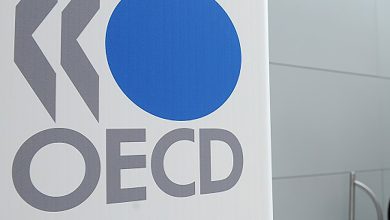Türkiye’s inflation to fall sharply: Europe’s largest asset manager

Türkiye’s inflation is expected to sharply decline by the end of 2024, the co-head of Europe’s largest asset manager Armuni said Tuesday.
Speaking exclusively to Anadolu Agency (AA), Sergio Strigo said Amundi is already involved in Turkish local assets with a medium-term horizon and could increase its exposure to the country if it sees more positive macroeconomic data.
“Stance on Turkish assets remain positive, with the Turkish lira and shorter-dated Turkish local bonds particularly attractive on the bond side, but the longer-term yield curve has also improved significantly,” he said.
Strigo said the financial returns are attractive, which warrants the asset manager to take a more medium-term view, with six to 12 months.
“If we buy a one-year bond, this doesn’t mean after one year we will get out of Türkiye completely. Because we can probably buy another bond for another year,” he said.
“If we see more positive macroeconomic data we might increase our exposure to Türkiye with the same type of horizons.”
“To be more bullish on the long end of the local yield curve, we would like to see signs of inflation significantly coming down,” he said, adding that the inflation figures last month were already better than the expectations.
Türkiye’s annual consumer inflation significantly cooled to a nine-month low of 61.78% this July, below economists’ forecasts.
Headline inflation fell for a second consecutive month in July from 71.60% in June
According to Amundi’s forecast, inflation in Türkiye is expected to fall to around 50% in August.
The disinflation process is forecast to follow a slightly milder course, with inflation declining to the 40-45% band by the end of the year.
Rosier forecasts
U.S. investment bank J.P. Morgan lowered its year-end inflation forecast for Türkiye from 43.5% to 42.5% and its inflation forecast for the end of 2025 from 25.2% to 25%, according to a note published last month.
Goldman Sachs expects Turkish inflation to fall to 36% at the end of the year, while U.S. Morgan Stanley lowered its year-end inflation forecast for Türkiye from 43.4% to 42.4% and predicted inflation at the end of 2025 would be at 25.2%.
British bank Barclays also lowered its year-end inflation expectation from 44.5% to 44% and predicted inflation at the end of 2025 would be 30.8%.
Similarly, Deutsche Bank analysts forecast year-end inflation at around 40%.
Strigo stressed that the outlook for the Turkish economy and Turkish assets will remain constructive as reforms continue and macroeconomic indicators gradually improve.
“We have seen obvious credit rating upgrades and we believe that essentially there will be more,” he added.
Ratings agencies Fitch, S&P, and Moody’s upgraded Türkiye’s credit rating since the country has seen a dramatic shift in its macroeconomic policies.
In addition to Amundi, other asset management companies have recently shown a positive approach towards Turkish assets.
Vanguard, the world’s second-largest asset management company, announced they had decided to reengage in Turkish lira-denominated government bonds, reporting a period of good performance in local bonds that could complement their lira positions.
U.S. Pimco, with a portfolio size of $1.9 trillion, also announced that they looked favorably on Turkish assets, especially lira-denominated assets.






